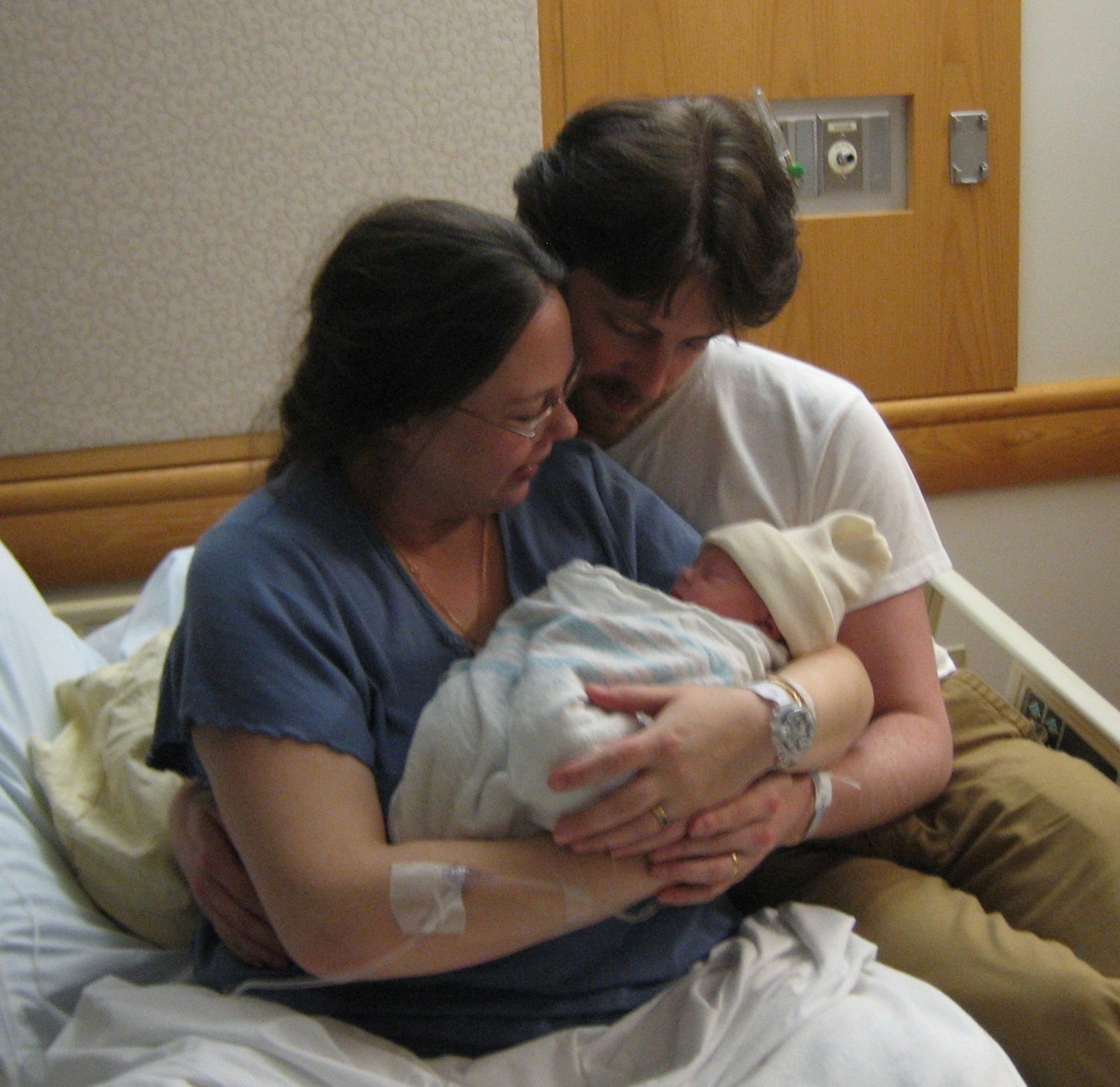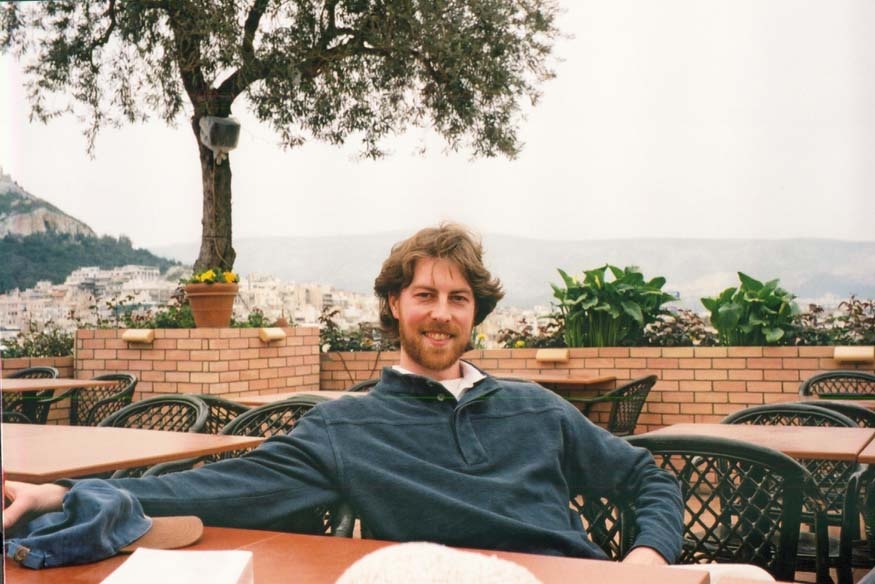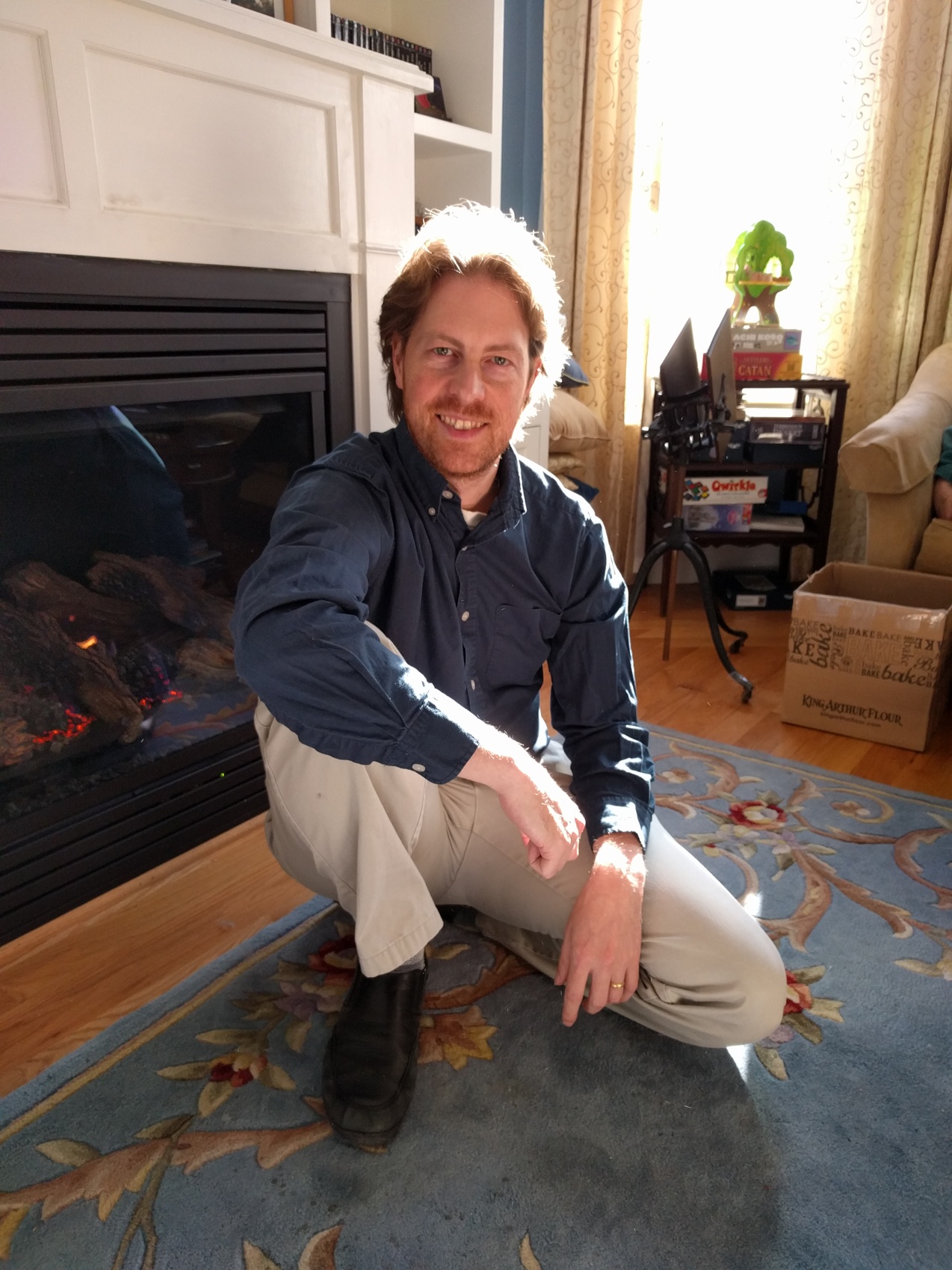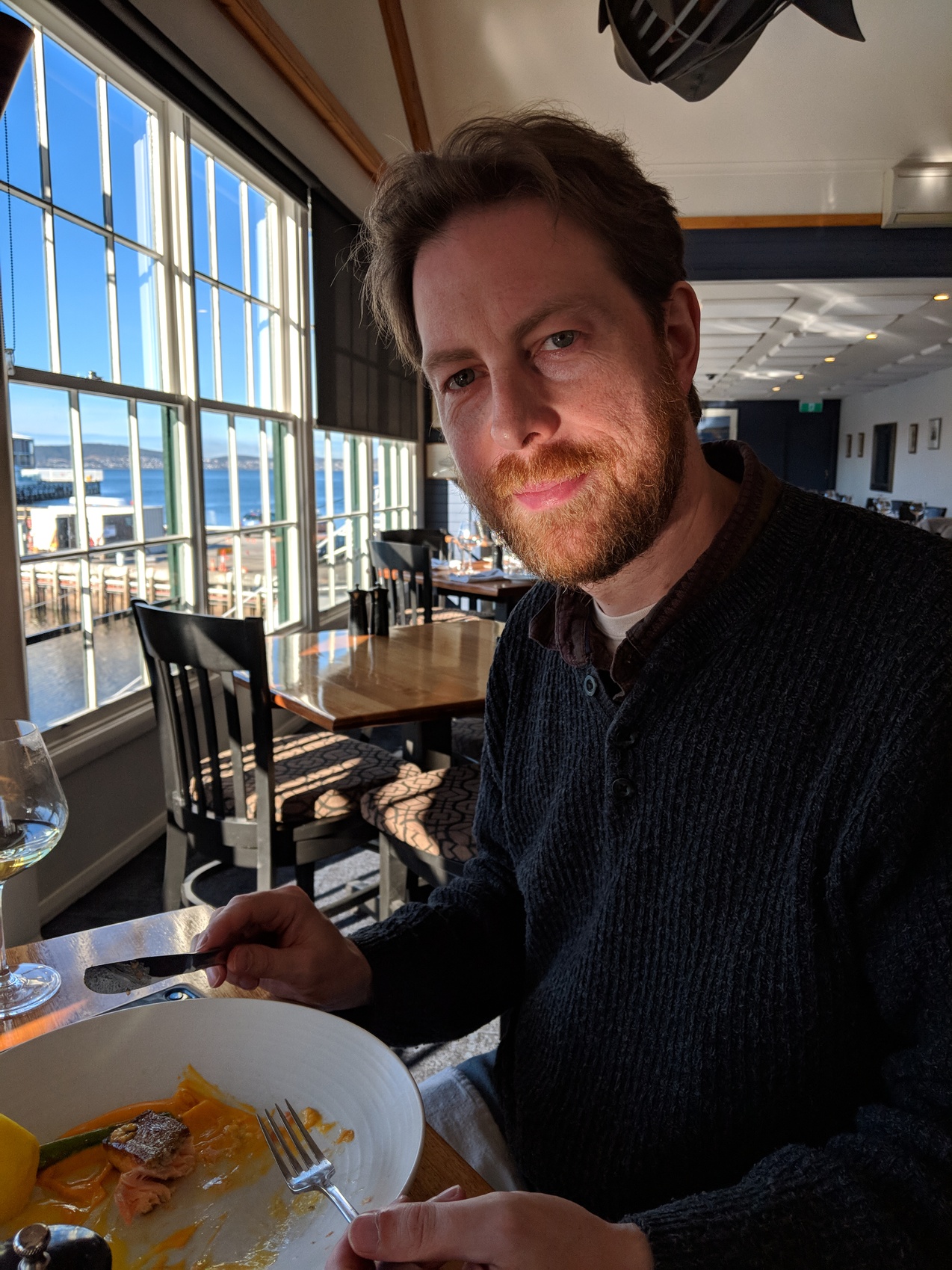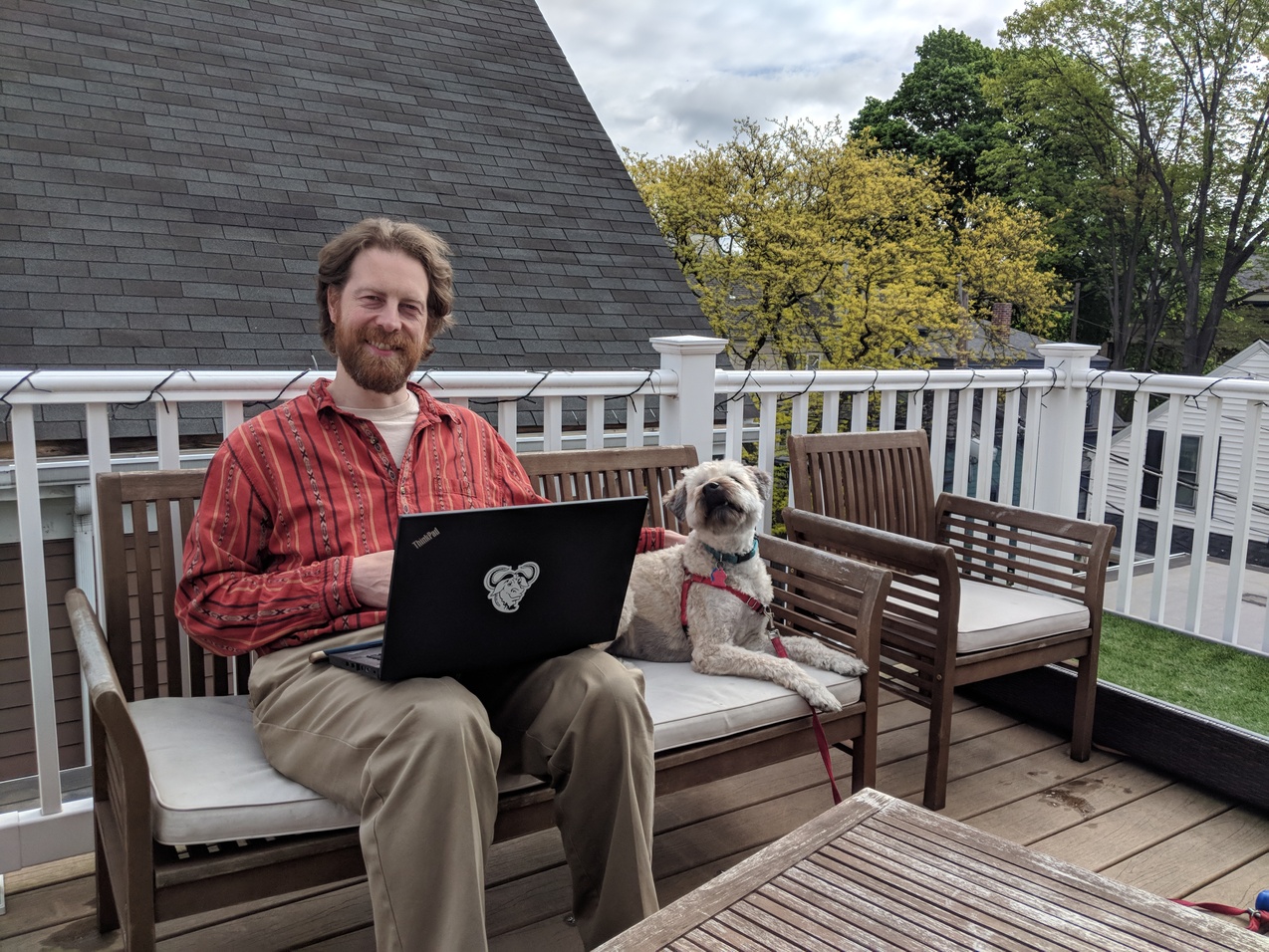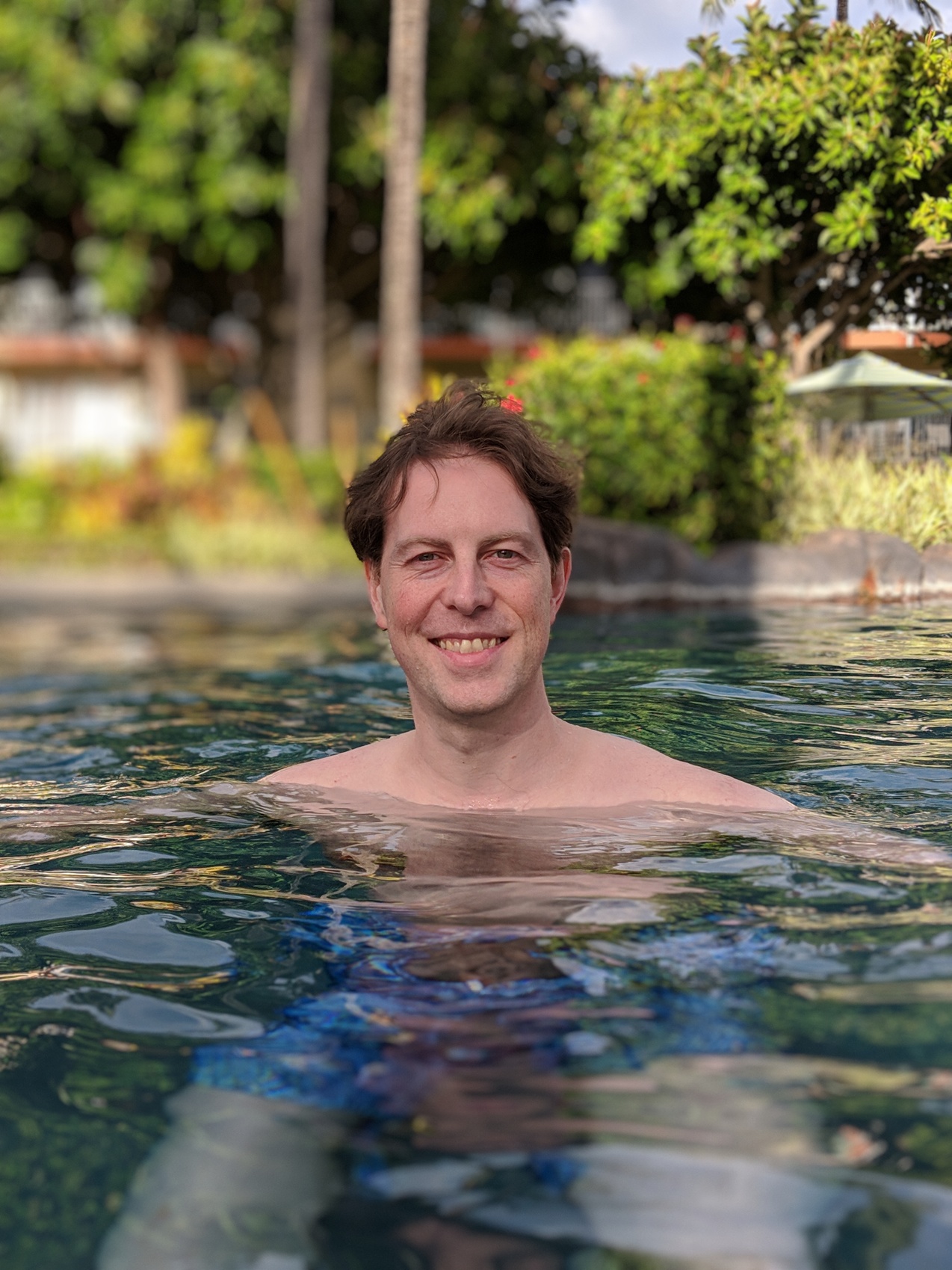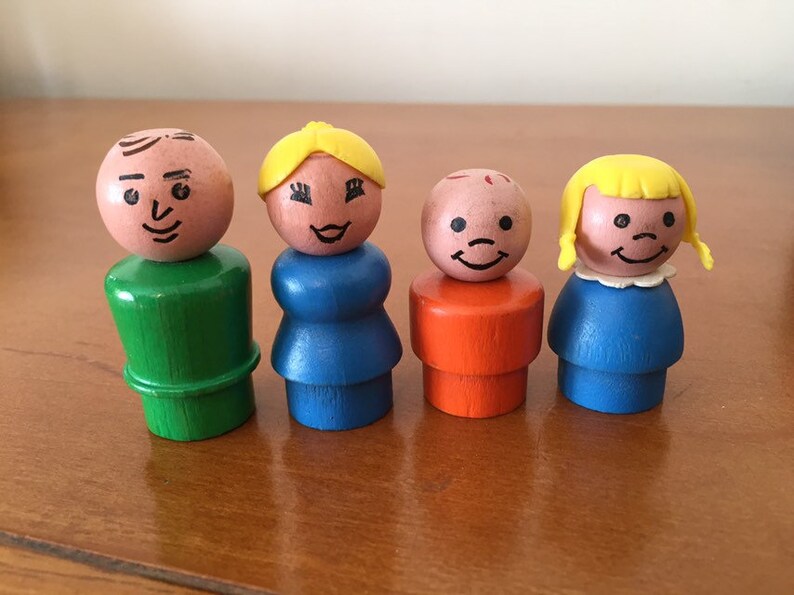This was written a couple of weeks after Alice’s birth. Reading through it the most surprising thing is how little I remember of any of it…On Sunday afternoon Jason was working with our friend, Jo, to get the last bits of painting done in the bathroom, while I was busy making a huge batch of chicken pot pie as part of my project to fill our new freezer. Leah had arrived from Northampton to spend a couple of days with us and Jack had come by to talk about set design issues for Arms & The Man, but had left shortly before.

Jo had just helped me to take the pot pie out of the oven at 8:30pm, when I realized I needed to pee—this was a frequent occurrence—so I ran upstairs and barely made it before there was a small gush of liquid. It was odd, but I just thought it was a new variation on having to pee all the time. I went back downstairs and felt a cramp, but it passed quickly and I thought I must be hungrier than I had thought. I had started dishing up the pot pie, when I felt myself leaking again, so I went into the downstairs bathroom, where Jason was working and, again, there was an odd gush. The dots connected and I told Jason that I thought my water was breaking, but it seemed to be happening gradually and we’d just see how it went.
We dished up the pot pie and took it to the table, when I felt things letting go again, so I ran for the john once more and this time there was a much larger gush, followed by another cramp. Back at the table, I explained to Jo and Leah what was going on. I finished my dinner and then Jason put in a call to the OB’s office, while Jo and Leah helped me finish packing up my hospital bag and I called my sisters and parents and Jason let his mom know that things were starting to happen. There was no return call from the OB after half an hour, so Jason called again and it turned out the first page had gone out with the wrong number entered. This time a nurse practitioner called back within about ten minutes.
The NP questioned me and recommended that I head in to Mt. Auburn for fetal monitoring. We finished packing up and finally got out the door about quarter to eleven. The contractions had continued to come about every ten to twelve minutes and I’d had some more leaking and another big gush. Fortunately, I had bought some Depends pads and that was mostly catching the fluid. I decided that I preferred to drive—I tend to feel the bumps less when I’m the one driving—and we made it to the hospital just before eleven. I went in through the emergency entrance, while Jason went to park the car, but the main admissions desk was still open, so they sent me upstairs to fill out the paperwork there and Jason met me at the desk.
We got our paperwork and bracelet and headed up to the Birthing Place on the fifth floor. I went to the bathroom again and then went into an exam room. The nurse on duty—Pam, who led our childbirth prep classes—got me hooked up to the monitors and then the OB on call, Dr. Sylvia Fine, examined me externally and guessed the baby’s weight at a little under seven pounds. They had some trouble getting a good recording of the heartbeat and contractions, but everything seemed to be going fine. Then I started throwing up and they moved me over to Birthing Room 1, where I was able to shower off and get better recordings. Pam had me try the birthing ball, but I found the vibration of it exacerbated my nausea and gave up on that pretty quickly.
At that point they wanted me to stay, but I was eager to go home, so after an initial IV of fluid and antibiotics, they let us leave about 2am. The contractions were coming about every five minutes, but I wasn’t actually feeling about half of them, so I still had about ten minutes of feeling fine in between them. On the way home, the nausea was hitting more strongly and the contractions coming harder and faster. We had hoped to watch Battlestar Galactica and get a few hours of sleep in our own bed, but I was unable to focus on the TV and I started heaving pretty continuously.
After about ninety minutes of this—poor Leah, having to listen to my distress—I decided I’d been wrong to think I wanted to be at home and we headed back, with Jason driving this time. During the time at home, I had started asking him to count while the contractions lasted and I found that really helped me, especially as we bounced along the bumpy Cambridge streets.
Pam, the nurse, teased me a little for coming back so quickly, but I just said that now I knew that I wanted to be there, which was good to know and would make things easier for me and she shut right up. She is an older woman—thirty-six years as an obstetric nurse—with a no-nonsense manner, but very compassionate when needed. While I was throwing up, she held my head and patted my back and made me feel about as comforted as possible. Very quickly I requested anti-nausea drugs and waited until the Zofran took effect before deciding that even without the nausea, I still wasn’t dealing well with the pain of the contractions and wanted an epidural.
I was amused to read the Entertainment Weekly’s Shaw Report (their version of “Hot or Not”) this week and find that silent births are “out,” hiring a midwife is “five minutes ago,” and what’s “in”? Yup—epidurals. I feel so trendy now, but at least I was ahead of the curve!
The insertion of the epidural catheter into the fluid sac around my spinal cord wasn’t painful, although it did feel quite odd, and it was definitely a relief. From all accounts—and the staff’s feedback—my epidural was particularly good, in that I never lost control of my lower body. It felt numb and I couldn’t feel the contractions at all, but I could still sit up and roll over more than the staff seemed to expect. I think that if some emergency had required me to get up and walk, I could have done it with some concentration, but was just as happy not to have to. Having the urinary catheter in was a relief, as well—after weeks of having to pee constantly, I could just relax and forget about that particular function. I got a little too relaxed when the epidural was first kicking in—my diastolic dropped down to 24—so they gave me some ephedrin via IV and when that didn’t have much effect, the anesthesiologist hit me with a syringe of the stuff and that picked things right up.
That was all done by about 6am on Monday morning and then came several hours of lying in bed, watching the sunrise over Boston and the rush hour traffic building and ebbing. Because I have moderate sleep apnea, any time I began to really drift off to sleep, my oxygen level would dip and a beeping alarm would start up and if I didn’t grab the mask and take some deep breaths, the nurse would pop her head in and remind me. But when I was awake, it was fine. So I would take off the mask to talk to someone, or have some ice chips, and then drift off and the alarm would go and… That made it difficult to get much solid sleep.

The shift changed at 8am and the team that would actually deliver the baby came on. The OB on call was Dr. Amy McGaraghan. She was being shadowed by a Harvard Med student named Katie, who not only attended all of the doctor’s time with me, but came by to interview us about our experiences with pregnancy, which passed the time very pleasantly. My nurse was a pleasant, younger woman named Chris, who grew up in New Hampshire, had lived for several years in San Diego, and recently returned to New England, so we had a pleasant time chatting about the differences between the coasts.
There was a little excitement on the ward, accompanied by much screaming, as two women both came in around the same time, both 10cm dilated on arrival—too late for pain meds. Chris and Katie both rushed to assure me that I shouldn’t let the screaming scare me, as it wasn’t going to be like that for me. I was too relaxed to worry much, but it added to the difficulty of sleeping. Jason slept through most of the morning, waking up occasionally to check on me and read to me, but I encouraged him to get sleep while he could. He ordered a breakfast sandwich from the cafeteria and pronounced it very tasty.
We were able to use our cell phones in the birthing suite, which was a nice surprise, so I talked to my sister, Beckie, a couple of times to keep her updated and we agreed that she would come over at lunchtime and see how things were going.
The various external monitors continued to not provide as clear readings as the staff wanted, so we agreed to switch to internal monitoring—one inserted alongside the baby’s head to record my contractions and the other attached to the baby’s scalp to watch her vital signs. I began to be very amused by all the tubes and wires trailing out of my lower half and to be just as glad I didn’t have to see or feel them.
At some point late morning, the doctor checked me and I was 8cm dilated and she recommended a dose of pitocin to pick up the pace of my contractions. That worked like a charm and we called Beckie to say that she should plan to stay once she got there. She arrived about one and the contractions were starting to be much stronger. As the epidural ebbed, I began to be able to feel them more and more. The doctor was in the OR doing a c-section and sent word that I should not start pushing. Katie and Chris had me do a little “practice” pushing to see if I could get the hang of it and that went well enough that we didn’t do it for long.
Beckie arrived and settled in and eventually the doctor came in and the real work began. We tried various positions and I found that I was most comfortable on all fours—basically in child pose—and that being on my side felt really awkward and ineffective. Being on my back was also fine, but not as effective at that point as they wanted. I moved around, pushing with the contractions, for what I guess was about two hours. Eventually I ended up on my back again, with Jason holding one leg, Katie the other, and Beckie holding my hand.
The last twenty minutes hurt. A lot. The room was pretty crowded at that point, with Jason, Beckie, Dr. McGaraghan, Katie, Janet (the nurse who replaced Chris at the afternoon shift change), the pediatrician and the pediatric nurse all standing around and saying encouraging things. The one time I swore during the process was when it felt as though everyone were jabbering at me to the point that it was making it hard to focus and follow the doctor’s instructions, so I told them all to shut up. At another point, I suddenly started crying, and everyone but Jason said “what’s wrong?!” and he said “it hurts!” It’s good to have someone who understands me!
For a while we were making good progress, but we kept getting the crown of her head just poking out and then slipping back between contractions—I just couldn’t hold it long enough to pop. So the doctor asked if we’d be ok with her using the vacuum suction thingy and we said sure. She attached it and used it to hold the baby’s head in place between two contractions and on the third, out came Alice at 4:24pm.
The last push, to get her body out, was easy and then the pediatric folk set to work on cleaning her off—they got Jason to cut the cord, which he hadn’t been planning to do, but was glad to have been involved in the process—while the doctor got the placenta out. That thing was enormous! After that there was apparently some bleeding that they were concerned about for a few minutes, but it let up and seems to have been ok. I was pretty exhausted by this time, so it was all a little blurry. The doctor checked for tears, but found only abrasions, three of which were bleeding enough for her to tack up with a stitch. All the tubes and wires were removed, except for my IV tap, which they left in just in case I were to have more bleeding and need fluids or drugs.
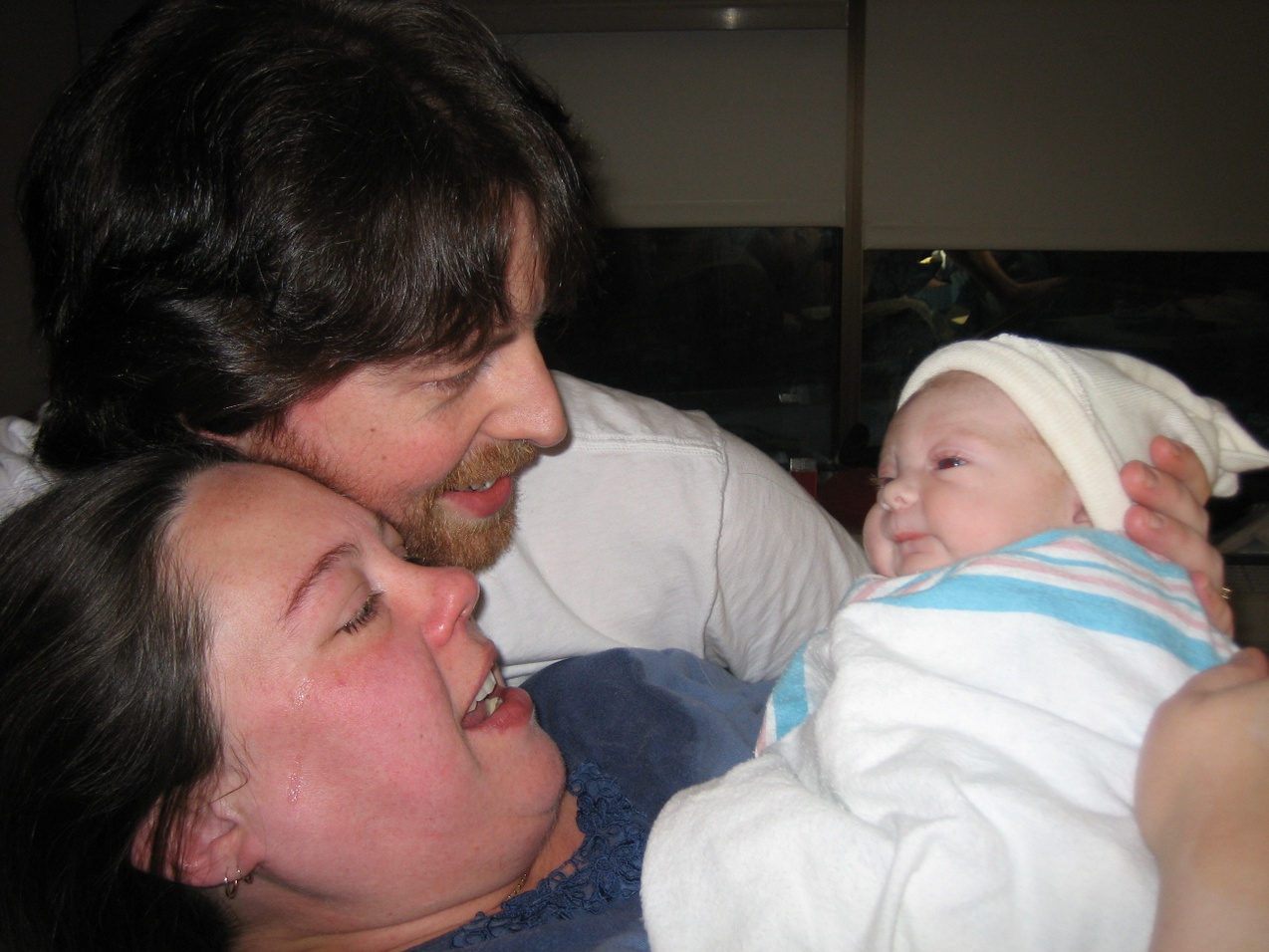
They brought Alice to me after the weights and measures routine and the three of us took a good look at each other and I was able to get her to latch on and nurse for a few minutes right away. Then Jason went off to the nursery with her for her first bath and testing, while Beckie stayed with me. Janet had me up on my feet pretty quickly and seemed surprised that I was able to walk. It took a bit of concentration getting to the bathroom, but by the time I came back, it felt much more normal. Beckie packed up all our junk and Janet popped me in a wheelchair for the trip down to my recovery room, on the other end of the floor.
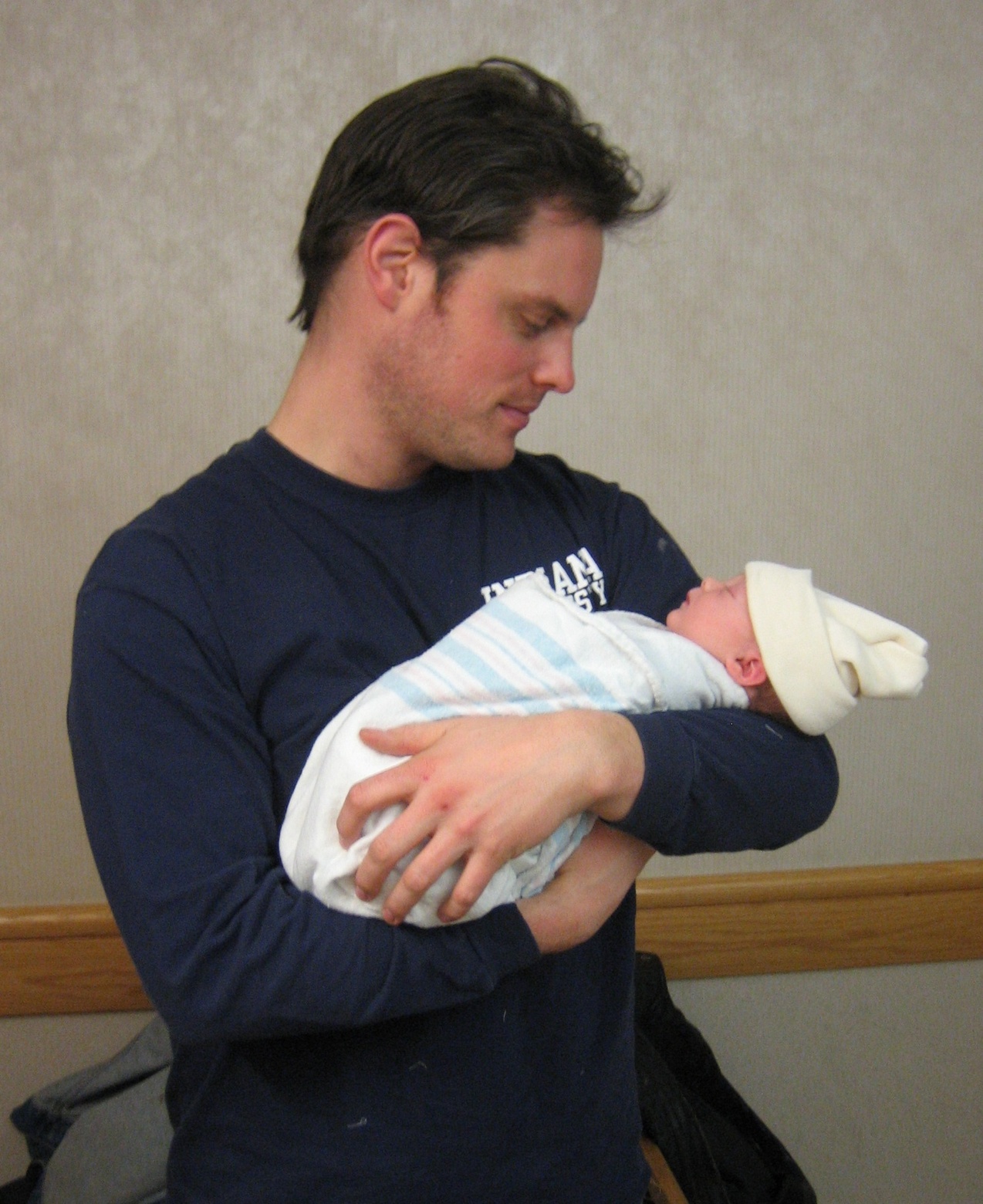
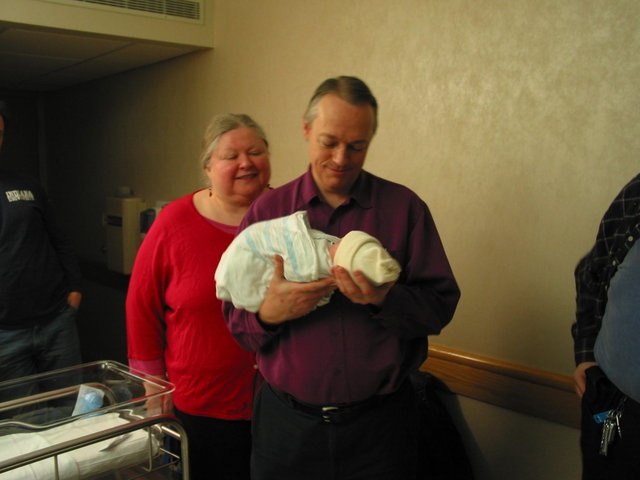
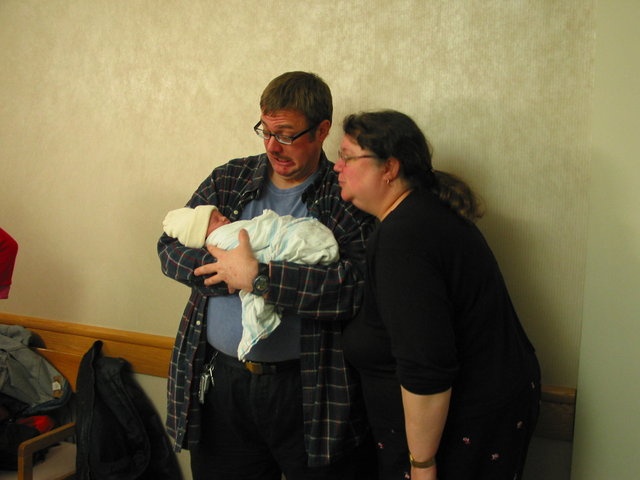
Jason came back with the baby and we began to settle in. We ordered some food to be brought up for all of us—chicken soup and a grilled cheese sandwich were very tasty after twenty-four hours of fasting—and before we could finish, the rest of the aunts & uncles arrived, singing “venite adoremus”. OK, not really, but that was the theme of the evening. By about 8pm we said goodnight to everyone and settled in for our first night as a family of three.
